The 57th Session of the Human Rights Council
9 September to 11 October 2024
Item 10: Technical assistance and capacity-building
Interactive Dialogue with Independent Experts on the human rights situation in the Central African Republic
7 October 2024
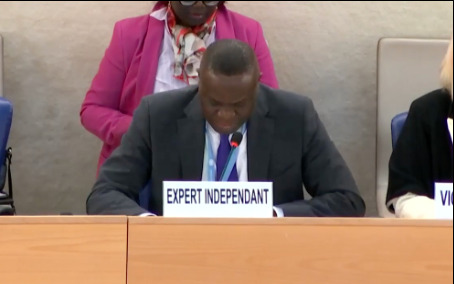
By: Yazan Hamid / GICJ
Executive Summary
On 7 October 2024, the council considered the report of Yao Agbetse, the Independent Expert on the Central African Republic (CAR) (A/HRC/57/59), during an interactive dialogue in the 42nd meeting of the 57th Regular Session of the Human Rights Council.
Yao Agbetse, the Independent Expert on the Central African Republic (CAR), opened the session by delivering a comprehensive overview of the human rights situation. He underscored the severe human rights violations committed by various actors, including armed groups, state forces, and foreign mercenaries, particularly the Wagner Group operating under the guise of Russian bilateral forces. Agbetse highlighted that the CAR remains deeply fragile, with widespread violence and rampant impunity perpetuating the conflict. He focused on the persistent failure of the disarmament, demobilisation, and reintegration (DDR) process, noting that out of 14 armed groups, only 92 factions have committed to disbanding, leaving large swaths of the country under the control of armed militias.
Agbetse further emphasised the role of the judiciary, particularly the Special Criminal Court (SCC), in holding perpetrators accountable. He acknowledged the SCC's first successful convictions against members of the 3R armed group but also lamented the court's slow pace and the lack of resources, which hinder its broader efforts. The case of Hassan Bouba Ali, a high-profile figure implicated in war crimes, was cited as an example of how political interference continues to obstruct justice in CAR.
On the humanitarian front, Agbetse described the deepening crisis, with over 2 million people in need of urgent assistance, widespread food insecurity, and ongoing displacement exacerbated by violence and environmental factors. He called on the international community to bolster financial and logistical support to help CAR address these critical challenges ahead of the 2025 elections.
Background
CAR has been locked in a cycle of conflict since 2013, marked by armed groups vying for control of resource-rich territories. The 2019 Political Agreement for Peace and Reconciliation and the Luanda Road Map were designed to bring an end to the violence, but implementation has been fragmented and inconsistent. Armed groups continue to wield power across large portions of the country. These groups have been responsible for extrajudicial killings, sexual violence, and the displacement of civilians, with the government largely unable to assert its authority outside the capital, Bangui.
In addition to internal strife, foreign mercenaries, especially Russian forces linked to the Wagner Group, have been implicated in severe human rights violations, exacerbating the violence. The involvement of these actors in the country’s resource exploitation has raised further concerns about the long-term security and sovereignty of CAR.
Despite the presence of the UN Multidimensional Integrated Stabilization Mission in the Central African Republic (MINUSCA), the security situation remains volatile. The country’s upcoming 2025 elections present a major test for its fragile democracy, with opposition parties expressing fears that the electoral process will be neither free nor fair.
Report of the Independent Expert on the situation of human rights in the Central African Republic
[26 August 2024]
The Independent Expert on the human rights situation in the Central African Republic, Yao Agbetse, presented a detailed report covering the period from July 2023 to June 2024. His report delivered a critical analysis of the political and security environment, human rights violations, the efforts toward justice, and the severe humanitarian crisis that continues to affect millions of Central Africans.
Agbetse’s report opened with a thorough assessment of the political situation in CAR, particularly in the lead-up to the 2025 elections. He highlighted that while the 2019 Political Agreement for Peace and Reconciliation and the Luanda Road Map were initially seen as promising frameworks for ending the conflict, their implementation has been slow and inadequate. The disarmament, demobilisation, and reintegration (DDR) process, which is a cornerstone of these agreements, has largely stalled. Out of the 14 armed groups that were signatories to the peace agreement, only a small fraction have fully complied. The failure of many groups to disarm and reintegrate into society has perpetuated instability, with armed factions continuing to exercise control over large swathes of the country, particularly in resource-rich areas.
This incomplete disarmament process has had a direct impact on the political environment as well. Agbetse emphasised that the CAR government’s inability to fully assert control over its territory, combined with the pervasive influence of armed groups, is creating significant obstacles for the 2025 elections. The opposition parties have expressed serious concerns about the electoral process, warning that the violence and lack of political inclusivity threaten the legitimacy of the elections. Agbetse underscored the need for political dialogue and reconciliation, as well as the necessity for security measures that can guarantee a peaceful and transparent electoral process.
The report documented an alarming number of human rights violations across the country, reflecting the fragile security situation and the impunity enjoyed by perpetrators. Agbetse reported 2,724 violations that affected over 4,121 victims. These violations were perpetrated by a variety of actors, including state security forces, armed groups, and foreign mercenaries.
Armed groups were responsible for the majority of the violations, accounting for more than 1,575 cases. These included targeted killings, enforced disappearances, abductions, sexual violence, and the recruitment of child soldiers. The areas controlled by these militias, often rich in natural resources, have seen high levels of exploitation, where local populations are subjected to forced labour or violent extortion. Agbetse noted that women and children remain particularly vulnerable as they are disproportionately affected by sexual violence and exploitation at the hands of these groups.
A particularly disturbing element of the report was the role played by Russian mercenaries, primarily linked to the Wagner Group. These forces have been accused of committing some of the most brutal violations in the country, including extrajudicial killings, torture, and the widespread targeting of civilians. The report noted that Wagner forces are deeply involved in the protection of CAR’s leadership but have been implicated in extensive human rights abuses, especially in regions where CAR’s natural resources, such as gold and diamonds, are extracted. This has raised significant concerns about the exploitation of the country’s resources for the benefit of foreign interests, further fueling instability.
State security forces, including the military and police, were also implicated in human rights abuses. The report detailed 1,149 violations committed by state actors, including arbitrary arrests, torture, and summary executions. These abuses further contribute to the already fragile security situation and undermine public trust in the government’s ability to uphold the rule of law.
Despite the dire human rights situation, the report noted some progress in efforts to address impunity, particularly through the work of the Special Criminal Court (SCC). The SCC, which was established to prosecute war crimes and crimes against humanity, has achieved several important convictions over the past year. Notably, it secured its first verdict against members of the 3R armed group (Return, Reclamation, Rehabilitation), who were found guilty of orchestrating massacres and committing sexual violence. These verdicts were seen as a landmark moment in the fight against impunity as they demonstrated the ability of CAR’s judicial system to hold perpetrators accountable for serious violations.
However, Agbetse’s report emphasised that the fight against impunity remains fraught with challenges. The SCC is severely under-resourced, and its ability to carry out prosecutions on a wider scale is limited by political interference and logistical constraints. Witness protection is a particular concern as many witnesses and victims fear retaliation for testifying against powerful armed groups or government officials. Agbetse pointed to the case of Hassan Bouba Ali, a former government minister accused of war crimes, whose trial has been delayed due to political meddling. This case highlights the ongoing difficulties in achieving accountability at the highest levels of government and security forces.
The report also highlighted the role of MINUSCA, the UN’s peacekeeping mission in CAR, in supporting the judicial system and maintaining security in some of the most volatile regions. However, MINUSCA itself has faced challenges, including allegations of sexual exploitation by some of its peacekeepers, which have undermined trust in the mission.
The humanitarian situation in CAR continues to deteriorate with over 2 million people in urgent need of assistance, according to the report. The violence has displaced more than 1.5 million people, both internally and across CAR’s borders, into neighbouring countries such as Chad, Cameroon, and the Democratic Republic of the Congo. The influx of refugees has overwhelmed the limited resources of these neighbouring states and further strained the humanitarian capacity of international organisations.
Food insecurity remains one of the most pressing issues. Agbetse reported that a significant portion of the population is facing acute malnutrition, with many regions of the country relying entirely on humanitarian aid for survival. Environmental challenges, including flooding and droughts, have compounded the situation as these disasters have destroyed crops and homes, leaving families without access to basic necessities. The healthcare system is also on the brink of collapse, with hospitals and clinics suffering from shortages of staff, medicine, and equipment. The spread of infectious diseases, including malaria and COVID-19, continues to claim lives in a system already overstretched by the sheer scale of the crisis.
Agbetse called on the international community to provide increased financial and logistical support to address these urgent needs. While some donor countries have pledged additional aid, the report underscored that these contributions are still far short of what is required to stabilise the situation. The Independent Expert stressed that without sustained humanitarian assistance and efforts to address the root causes of the crisis, particularly the political and security challenges, CAR risks further deterioration and prolonged suffering for its people.
Interactive Dialogue
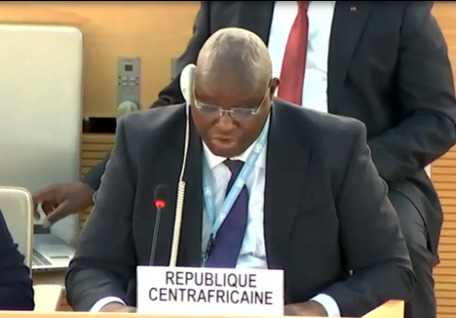
Central African Republic (CAR): CAR acknowledged the significant challenges outlined in the Independent Expert’s report but also defended the government's ongoing efforts to restore peace and stability. The CAR delegation emphasised the importance of the 2019 Political Agreement for Peace and Reconciliation despite the incomplete compliance by armed groups. They also defended the presence of Russian bilateral forces (Wagner Group), asserting that these forces support the country’s security while promising that allegations of abuses are being addressed.
Regarding justice, the CAR delegate pointed to the progress made by the Special Criminal Court (SCC), especially the recent convictions of 3R group members for war crimes. The delegation stressed the need for additional resources to ensure the court’s continued effectiveness and to protect witnesses. On the humanitarian front, they called for increased international support to address the worsening food insecurity and displacement crisis.
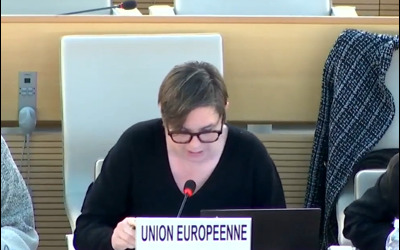
European Union (EU): The EU delegation condemned the widespread human rights violations in CAR, calling for an urgent need to disarm and dismantle armed groups ahead of the 2025 elections. The EU delegate stressed the importance of ensuring that the electoral process is transparent, inclusive, and free from intimidation. The representative underscored that peace and justice are inseparable and urged CAR to continue strengthening its judicial institutions to combat impunity, especially for violations committed by armed groups and foreign forces.
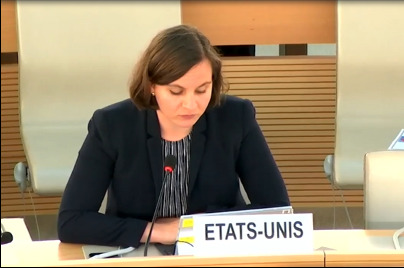
United States: The U.S. representative expressed deep concern over the role of foreign mercenaries, particularly the Wagner Group, in exacerbating violence and instability in CAR. The U.S. delegate highlighted the devastating impact of these forces on CAR’s sovereignty and security, calling for immediate international action to hold them accountable for human rights violations. They also urged the CAR government to improve transparency and governance, emphasising that without these reforms, the upcoming elections could further destabilise the country.
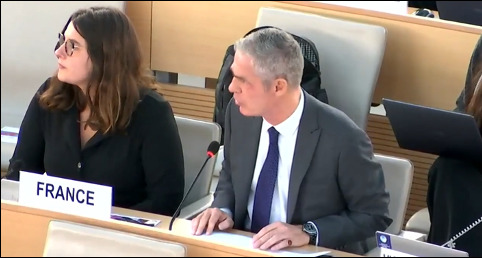
France: France’s representation echoed the U.S.’s concerns regarding foreign interference but also focused on the need to strengthen domestic judicial mechanisms. The French delegation praised the work of the Special Criminal Court, particularly its recent verdicts against 3R members, but called for broader efforts to address impunity at all levels of society. They also emphasised the importance of international cooperation in supporting CAR’s fragile institutions, including the judiciary and security forces, in preparing for the 2025 elections.
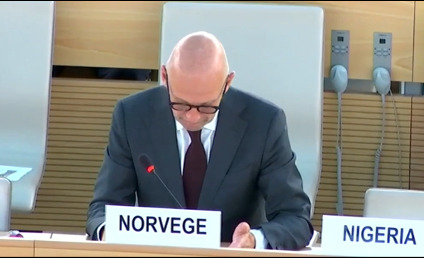
Norway: Norway’s delegation expressed its deep concern over the continuing violence and human rights violations perpetrated by both armed groups and foreign mercenaries, especially in resource-rich areas. The representative focused on the devastating impact this violence has had on women and children, particularly the widespread sexual violence documented in the Independent Expert’s report. They urged the CAR government to accelerate the disarmament process and engage more constructively in implementing the Peace and Reconciliation Agreement. Norway’s delegation also highlighted the role of international donors, calling for increased support to address the humanitarian needs in the country. In particular, they underscored that humanitarian aid must be coupled with efforts to rebuild CAR’s governance structures, including support for judicial reforms and enhanced protection for human rights defenders.
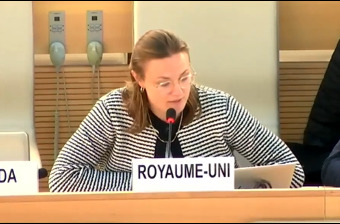
United Kingdom (UK): The UK representative welcomed the Central African Republic’s continued cooperation with the Human Rights Council and the Independent Expert's detailed report. They recommended the progress made by the Special Criminal Court (SCC) in prosecuting individuals responsible for war crimes and crimes against humanity but stressed the importance of ensuring that key individuals, such as former President Bozizé, face justice. They called on all states to support the SCC in enforcing arrest warrants and ensuring accountability, particularly for high-profile cases like that of Hassan Bouba Ali. Furthermore, they raised concerns about the increasing involvement of Russian mercenaries (notably the Wagner Group), accusing them of spreading brutality and perpetuating the conflict for their own financial gain. The delegate reiterated the need for the Multidimensional Integrated Stabilization Mission in the Central African Republic (MINUSCA) to continue its efforts despite the challenges posed by disinformation and foreign interference and questioned the Independent Expert on how CAR and international partners could combat the rising tide of hate speech.
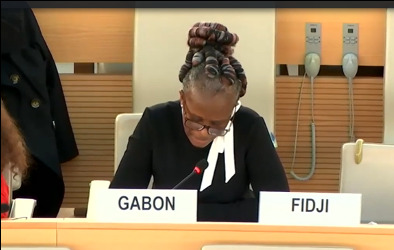
Gabon (on behalf of the African Group): Gabon’s representative praised CAR for its efforts in implementing parts of the 2019 Peace Agreement, acknowledging that significant challenges remain, especially regarding security and the activities of armed groups. They stressed the importance of enhanced regional cooperation particularly through the Economic Community of Central African States (ECCAS) to support the Disarmament, Demobilization, and Reintegration (DDR) process and help reintegrate former combatants into society. The representative emphasised that ECCAS is crucial in facilitating dialogue and ensuring the success of the peace process.
They also highlighted the need for CAR’s international partners to continue providing security and development support. While peacekeeping missions like MINUSCA have been essential, the delegate stressed that long-term stability requires not only strengthening security forces but also addressing economic and social development to tackle the root causes of conflict.
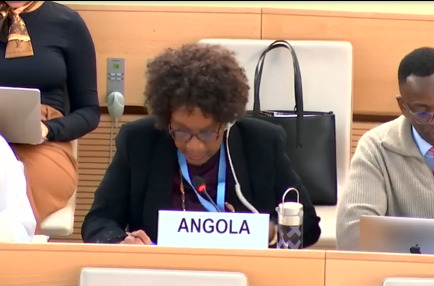
Angola and South Africa: Angola and South Africa’s delegation adopted a balanced approach during the dialogue, emphasising that any solution to the crisis in the Central African Republic (CAR) must equally focus on accountability and reconciliation. Both nations expressed strong support for the Special Criminal Court (SCC), highlighting its critical role in ending the culture of impunity that has allowed armed groups and political actors to commit grave human rights violations without facing justice. However, they also underscored the importance of a broader, more inclusive political dialogue to achieve lasting peace in CAR.
Angola’s delegation emphasised that while holding perpetrators accountable is necessary, punitive measures alone are insufficient to restore stability. They called on the CAR government to engage all factions, including opposition parties and armed groups, in meaningful negotiations. Highlighting the role of reconciliation in post-conflict societies, noting that peace agreements must be built on trust and dialogue to ensure all parties feel represented in the political process. The delegate also pointed to regional cooperation, stressing that neighbouring states and African organisations like the Economic Community of Central African States (ECCAS) could play a pivotal role in mediating and supporting the dialogue process.
South Africa’s representation echoed these sentiments, stressing that inclusive dialogue is key to a sustainable political solution. They called for the CAR government to ensure that the upcoming 2025 elections are conducted in a way that prevents violence and enhances the legitimacy of the political process. They advocated for armed groups to be included in peace talks, arguing that long-term peace can only be achieved if all stakeholders, including those responsible for past violence, are brought into the fold and given an opportunity to negotiate.
Closing Remarks
In his closing remarks, Independent Expert Yao Agbetse reiterated the urgent need for comprehensive action to address the multidimensional crisis in the Central African Republic (CAR). Agbetse emphasised that the ongoing human rights violations, political instability, and the country’s weak security infrastructure require sustained international attention and support. He stressed that the international community must go beyond providing humanitarian aid and actively engage in supporting long-term solutions, particularly in strengthening CAR’s governance, justice, and security institutions.
Agbetse highlighted the Special Criminal Court (SCC) as a key tool in CAR’s fight against impunity, calling for increased resources and support to ensure that justice can be served, especially in high-profile cases that involve political interference. He pointed out that the SCC’s work, despite being a significant step forward, is still constrained by limited funding and insufficient witness protection, which hinders broader accountability.
The Independent Expert also called on the CAR government to intensify its efforts in implementing the 2019 Peace Agreement and ensure the success of the Disarmament, Demobilization, and Reintegration (DDR) process. Agbetse underscored that the reintegration of ex-combatants into society is essential for long-term peace, but it cannot succeed without political will and international cooperation.
Agbetse closed by focusing on the upcoming 2025 elections, stressing that they represent a critical juncture for CAR’s future. He called for transparent, inclusive, and peaceful elections, warning that without proper security and political reforms, the elections could exacerbate existing tensions. The expert appealed to both the CAR government and the international community to prioritise the protection of civilians, human rights defenders, and journalists, as they are vital to maintaining democratic processes.
In his final note, Agbetse urged the international community to not lose sight of the humanitarian crisis gripping CAR, as millions remain displaced, food insecure, and without access to essential services. He reiterated that sustained, coordinated efforts are necessary to prevent further deterioration and to promote long-term stability in the region.
Position of Geneva International Centre for Justice
Geneva International Centre for Justice (GICJ) welcomed the interactive dialogue on the human rights situation in the Central African Republic (CAR) as a critical step towards addressing the country’s multifaceted crises. GICJ recognises the significant challenges CAR continues to face, particularly with regard to ongoing human rights violations, political instability, and the dire humanitarian situation. However, GICJ believes in a constructive and forward-looking approach to addressing these issues.
Our organisation commends the Special Criminal Court (SCC) for its role in combating impunity and ensuring justice for victims of human rights abuses while also acknowledging the need for further resources and international cooperation to expand its reach and efficacy. GICJ supports efforts to hold all perpetrators accountable, whether they are members of armed groups, state actors, or foreign mercenaries. We emphasise the importance of strengthening CAR’s judicial institutions to ensure that justice can be delivered in a transparent and fair manner.
At the same time, GICJ advocates for a holistic approach that combines accountability with reconciliation and inclusive political dialogue. We believe that peace in CAR can only be achieved if all political factions, including opposition parties and armed groups, are involved in a meaningful and sustained dialogue process. This requires not only political will but also the active involvement of regional bodies such as the Economic Community of Central African States (ECCAS) to facilitate negotiations and ensure the success of the Disarmament, Demobilization, and Reintegration (DDR) process.
Furthermore, GICJ strongly supports calls for increased humanitarian aid to address the ongoing food insecurity, displacement, and lack of access to healthcare that continue to affect millions of Central Africans. We stress the importance of pairing short-term humanitarian assistance with long-term development strategies that tackle the root causes of conflict, such as poverty and lack of governance. GICJ remains committed to working with international partners and civil society organisations to promote human rights, justice, and sustainable peace in the Central African Republic.







